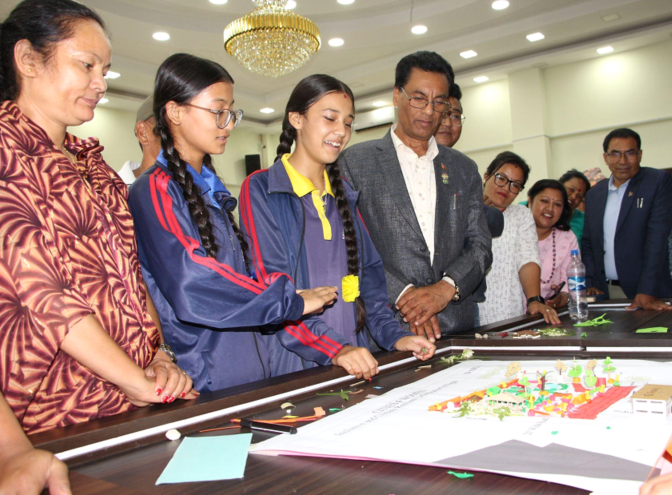The Cities 4 Women: Inclusive and Climate Resilient Urbanization in Nepal project aims to support municipalities in solving challenges posed by rapid urban growth and increasing climate vulnerability by planning, designing and building gender-responsive climate-resilient public open spaces. The project is co-funded by the European Union and USAID and is being implemented by UNOPS, UN-Habitat and Cities Alliance over four years in six municipalities in Nepal.
With a particular focus on enhancing the seven-step planning process and to ensure community voices are heard and acted upon, municipalities in Nepal are implementing participatory methods and tools including gender-based community mapping, selecting and co-designing public open spaces, and enhancing the leadership of elected women representatives in these participatory initiatives.
Leadership using participatory tools for community engagement
These initiatives engage diverse community members, including women, the elderly, youth, persons with disabilities, and marginalized groups, using Cities Alliance's participatory tools. It enhances local government capacity for participatory planning within Nepal's seven-step annual planning process and projects selection.
The Cities 4 Women Project aimed to enhance participatory leadership by involving community members and elected women representatives. This comprehensive approach to inclusive urban development, particularly for public open spaces, utilized tools such as inclusive planning, community mapping, and co-design workshops.
Inclusive Planning
Inclusive planning sessions involved collaborative workshops led by municipal mayors and elected members, including women representatives, to ensure gender-sensitive planning in municipalities. Municipal leaders learn about inclusion, gender mainstreaming in planning, participatory planning process, they discuss challenges, existing practices and way forward for upcoming annual planning. These workshops ended with a sensitized municipal leader on inclusive and gender responsive planning, and a way forward to incorporate knowledge from the workshop in upcoming annual planning.
The Tansen municipality's Municipal Executive Member, Ms. Manju Bishwakarma, claims that only a small number of people with access to political parties are able to attend annual planning meetings and priority setting stages. We must now make sure that nobody is left behind.
Gender-based community mapping
Led by elected women representatives, the Cities 4 Women Project carried out interactive workshops in five municipalities to identify and rank public open spaces. Community members discussed public spaces' preferences through workshops, revealing varying perceptions among age groups. Adult women view streets and alleyways as safe, while children fear them due to drug addiction and inadequate lighting. Workshops prioritized use, security, safety, cultural values, and accessibility of the public open spaces and provided lists to municipalities to be included in annual planning for endorsement with budget.
Co-design Workshops
The co-design workshops aimed to generate innovative, context-based solutions for public open spaces, ensuring community participation in the design process. The co-design process produced outputs such as community designed maps with innovative traditions and digitized solutions such as air index digital machines, vending machines, zebra crossings, tactile pavements, greenery, cultural sculptures, carvings, and inclusive seating arrangements.
"During the entire co-designing phase, I felt more like designing my own home and compounds"
Surya Kumari Shrestha, a senior citizen in Dhangadhi sub-metropolitan city

Reflecting on the fact that children are all too rarely included in the development of urban designs, Amin Bhusal, a member of the child club at Birendranagar municipality, adds:
"We used to dream of a child-friendly space, but after participating in this process I feel happy that we are getting the dreamt space very soon."

Finally, for Bindra Kumari Bam, a community users' group from Dhangadhi sub-metropolitan city:
"Being participated in the last event of gender-based community mapping held in our ward, I had never envisioned that I would be re-invited to co-design the space which we had prioritized."
The Cities 4 Women project has successfully engaged diverse community members and municipal representatives, particularly elected women, in identifying and designing public open spaces, addressing safety and inclusivity concerns. The participatory planning and co-design workshops have fostered a sense of ownership and accountability, paving the way for more inclusive and resilient urban development in Nepal.




